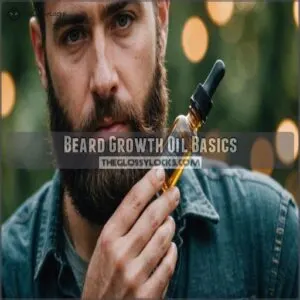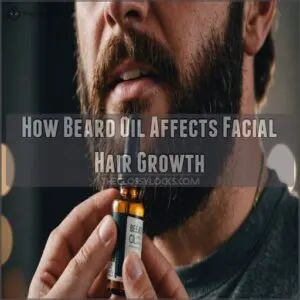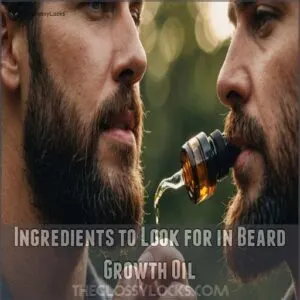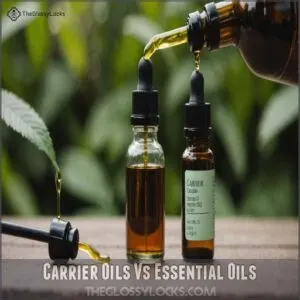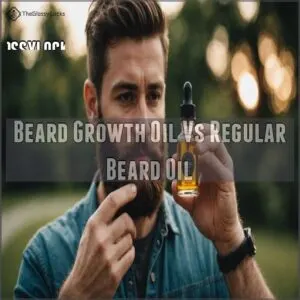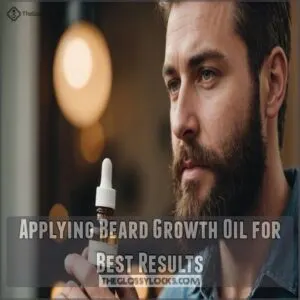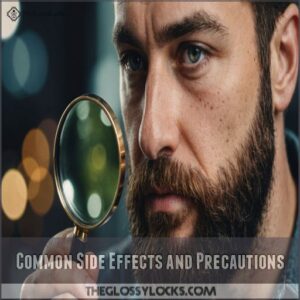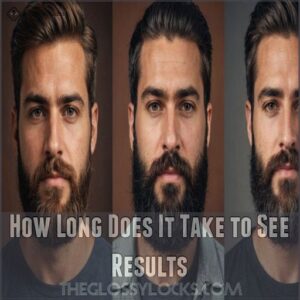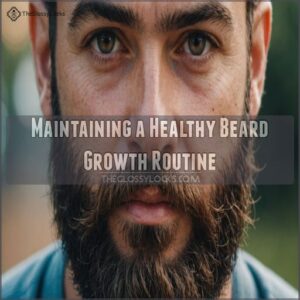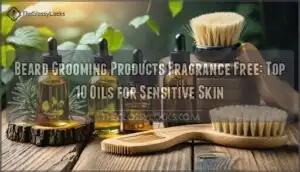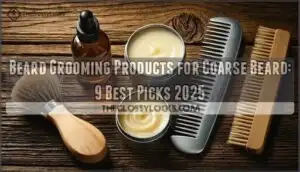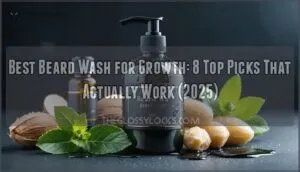This site is supported by our readers. We may earn a commission, at no cost to you, if you purchase through links.
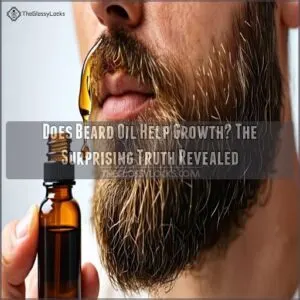 Contrary to popular belief, beard oil doesn’t directly stimulate growth.
Contrary to popular belief, beard oil doesn’t directly stimulate growth.
It’s not a magic potion that’ll turn you into a lumberjack overnight.
However, it does play a key role in your beard’s health and appearance.
Think of it as fertilizer for your facial forest.
Beard oil moisturizes the skin beneath your whiskers, reducing itchiness and dandruff.
It also conditions existing hair, making it softer and more manageable.
While it won’t sprout new follicles, a well-nourished beard looks fuller and healthier.
Beard oil, which can be used in conjunction with a beard conditioner for added benefits as seen in beard conditioner vs oil, helps to nourish the skin underneath the beard. So, if you’re aiming for that rugged, well-groomed look, beard oil is your secret weapon.
But there’s more to the story of maximizing your beard’s potential than meets the eye.
Table Of Contents
- Key Takeaways
- Beard Growth Oil Basics
- How Beard Oil Affects Facial Hair Growth
- Choosing The Right Beard Growth Oil
- Beard Growth Oil Vs Regular Beard Oil
- Applying Beard Growth Oil for Best Results
- Common Side Effects and Precautions
- How Long Does It Take to See Results
- Maintaining a Healthy Beard Growth Routine
- Frequently Asked Questions (FAQs)
- Does Beard oil make your beard grow?
- Does castor oil help with the growth of a beard?
- Can essential oils help a beard grow?
- Do beard oils affect facial hair growth?
- Can beard oil stimulate new hair follicles?
- Is beard oil effective for patchy beard growth?
- Are there age limits for using beard oil?
- How does diet affect beard oil effectiveness?
- Can beard oil change facial hair color?
- Conclusion
Key Takeaways
- While beard oil won’t directly stimulate new hair growth, using ingredients like sea buckthorn oil benefits for hair can help restore hair elasticity and regulate scalp moisture, it creates an optimal environment for your existing facial hair by moisturizing the skin and nourishing follicles.
- You’ll see the best results by applying beard oil 1-2 times daily and maintaining consistency for 4-6 weeks, though significant changes may take several months.
- Your beard’s growth potential is primarily determined by genetics, but you can enhance its appearance by choosing oils with key ingredients like biotin, vitamins A and E, and carrier oils such as jojoba or argan.
- You’ll want to distinguish between regular beard oil (for conditioning) and growth oil (containing DHT blockers and growth-promoting ingredients) – use regular oil daily for maintenance and growth oil 2-3 times weekly for targeting specific areas.
Beard Growth Oil Basics
You’ve heard of beard oil, but what about beard growth oil?
This specialized product combines moisturizing carrier oils with essential oils and hair growth ingredients to nourish your facial hair and promote faster, thicker beard growth.
What is Beard Growth Oil
Intrigued by the promise of fuller facial hair? Beard growth oil, a potent blend of natural ingredients, is your secret weapon.
It’s more than just moisturizer; it’s a targeted approach to boosting your beard game.
Here’s what you need to know:
- It hydrates your skin and beard, creating the perfect environment for growth.
- Vitamin B5 plays a crucial role in maintaining scalp health and preventing dryness or dandruff, which is essential for hair follicles nourishment. Many oils contain vitamins and nutrients that support healthy hair follicles.
- Choosing the right oil, considering your skin type and beard texture, is key.
- Consistency is essential; a regular beard oil routine maximizes its benefits.
How Does Beard Growth Oil Work
You’ve got your hands on beard growth oil, but how does it work its magic? It’s not just about slapping on some grease and hoping for the best. Beard growth oil targets your facial hair at the root, nourishing follicles and creating an ideal environment for growth. A crucial part of this process involves using a quality beard wash and exfoliating the skin beneath your beard to spur hair growth, as explained in beard wash techniques. Let’s break down the science:
| How It Works | What It Does |
|---|---|
| Hair follicle stimulation | Increases blood flow to roots |
| DHT blockers | Prevents hair loss |
| Vitamin absorption | Nourishes follicles |
| Moisturization | Reduces irritation |
| Carrier oil benefits | Improves overall beard health |
This power-packed formula gives you the upper hand in your beard game.
Key Ingredients for Beard Growth
Understanding what makes beard growth oil tick might give you the edge you need.
Ingredients like biotin and DHT blockers are key.
They block out growth inhibitors while enhancing your beard’s thickness.
Look for carrier oil types such as jojoba or argan, and spice things up with essential oil blends for that extra growth element potency, ensuring natural beard growth.
How Beard Oil Affects Facial Hair Growth
When you apply beard oil, you’re not just moisturizing; you’re also providing essential nutrients that may support facial hair growth.
These oils often contain vitamins and elements like biotin that can help create a healthier environment for your beard to thrive.
The Science Behind Beard Growth
Now that you’re familiar with beard growth oil basics, let’s unpack the science behind beard growth. Your facial hair’s journey is a complex dance of biology and chemistry. If you’re looking for products that can support your beard growth, you can find a range of beard oil growth options online, such as those available on beard growth oil products. Beard oil isn’t just a grooming product; it’s a growth catalyst.
Essential oils like rosemary oil, which is known for stimulating follicles and boosting blood circulation, can be found in hair growth oil recipes
- Horm
Role of Vitamins and Nutrients in Beard Growth
Vitamins and nutrients play a vital role in beard growth.
Your facial hair craves Vitamin E for strength, Biotin for thickness, and DHT blockers for fuller growth.
Nutritional deficiencies can stunt your beard’s potential, but the right mix of vitamins can work wonders.
Hair growth supplements designed for beards can fill the gaps in your diet.
Remember, a well-nourished follicle is a happy follicle, ready to sprout that majestic mane you’re after.
Impact of Beard Oil on Facial Hair Growth
Beard oil isn’t just a grooming tool; it’s your secret weapon for facial hair growth.
By incorporating hydrating carrier oils like argan oil for beard growth, beard oil creates the perfect environment for growth.
By moisturizing your skin and hair follicles, beard oil reduces itchiness and dandruff, allowing your beard to thrive.
It’s like giving your facial hair a nutrient-rich drink, helping you achieve that full beard look you’re after.
Choosing The Right Beard Growth Oil
You’ll find a wide range of beard growth oils on the market, each with its own blend of ingredients.
To choose the right one for you, focus on products that contain carrier oils like jojoba or argan, essential oils such as eucalyptus, and growth-promoting elements like biotin or saw palmetto.
Ingredients to Look for in Beard Growth Oil
Let’s talk ingredients that’ll make your beard grow like a weed.
You want a mix that packs a punch.
Look for carrier oils like jojoba or argan – they’re the workhorses that moisturize and nourish.
Essential oils? They’re the secret sauce.
Eucalyptus and peppermint can kickstart follicle action.
But the real MVPs are hair growth elements.
Biotin’s a superstar for thicker strands, while saw palmetto might keep that DHT in check.
Don’t forget vitamins A and E – they’re like fertilizer for your face forest.
Choose wisely, and you’ll be stroking a lush beard in no time.
Carrier Oils Vs Essential Oils
Now that you’ve got the scoop on ingredients, let’s break down the dynamic duo of beard oils: carrier and essential oils.
They’re not just fancy names; they’re the powerhouse behind your epic beard journey.
Carrier oils do the heavy lifting, while essential oils bring the pizzazz.
Here’s the lowdown:
- Carrier oils (like jojoba or argan) moisturize and nourish
- Essential oils (such as eucalyptus) add fragrance and extra benefits
- Blend them right, and you’ve got a custom growth elixir
Mix and match to create your perfect
Beard Growth Oil Vs Regular Beard Oil
You’ve got two types of beard oil in your grooming arsenal: regular beard oil and beard growth oil.
While regular beard oil moisturizes and conditions, beard growth oil goes a step further by including ingredients specifically designed to promote hair growth.
What is The Difference Between The Two
You’ve got your oils sorted, but what’s the real difference between beard growth oil and regular beard oil?
It’s all in the ingredients, my friend.
While both moisturize your facial hair, growth oils pack an extra punch with DHT-blocking superstars like biotin and saw palmetto.
You can even find products specially formulated for beard growth, like this popular beard oil, which is designed to help you achieve a fuller, thicker beard.
Let’s break it down:
| Feature | Growth Oil | Regular Oil |
|---|---|---|
| Purpose | Stimulate growth | Condition & soften |
| Key ingredients | Biotin, vitamins | Carrier oils |
| DHT blocking | Yes | No |
Growth oils aim to boost your beard game, targeting those follicles for thicker, fuller growth.
Regular oils keep your existing mane tamed and smooth.
Choose wisely, and you’ll be on your way to beard mastery!
When to Use Each Type of Oil
Timing is key in terms of beard oil types. Use regular beard oil daily for basic maintenance and conditioning. It’s your go-to for keeping your beard soft and manageable.
Switch to beard growth oil when you’re aiming to boost your facial hair game. Apply it 2-3 times a week, focusing on patchy areas or when you’re in the early stages of growth.
For the best of both worlds, alternate between the two. Regular oil in the morning for daily care, growth oil at night to work its magic while you sleep. This routine maximizes beard oil benefits and supports your growth goals.
Applying Beard Growth Oil for Best Results
You’re ready to boost your beard growth, but how do you use beard oil effectively?
Let’s explore the best practices for applying beard growth oil to maximize its benefits and help you achieve the facial hair of your dreams.
How Often to Apply Beard Growth Oil
Mastering the art of beard growth oil application is key to maximizing your facial hair’s potential.
Most experts recommend using it once or twice daily, depending on your beard length and skin type, with some even suggesting that oily skin may require application every other day for best results understanding beard oil frequency.
For shorter beards, a single application in the morning can work wonders.
Longer, thicker beards might benefit from a second round before bed.
Your daily routine should include massaging a few drops of oil into your beard and skin.
Remember, consistency is important.
Whether you’re using jojoba, argan, or a custom blend, regular use will keep your beard moisturized and primed for growth.
Tips for Applying Beard Growth Oil
To get the most out of your beard growth oil, start with a clean, damp beard.
Squeeze a dime-sized amount into your palm and warm it up between your hands.
Gently work the oil into your skin and beard, using your fingertips to massage in circular motions.
This boosts circulation and helps distribute the oil evenly.
Don’t forget to comb through your beard to make sure every hair is coated.
For best results, apply twice daily – morning and night.
Remember, consistency is key.
With regular use, you’ll tame that beard itch, banish dandruff, and say goodbye to brittleness.
Common Side Effects and Precautions
You’ll want to be aware of potential side effects when using beard growth oil.
Before applying it to your entire beard, it’s important to do a patch test to check for any allergic reactions or skin sensitivities.
Allergic Reactions and Sensitive Skin
While you’re excited to boost your beard growth, it’s important to watch out for allergic reactions.
Your skin mightn’t play nice with certain ingredients in beard oils.
Keep an eye out for redness, itching, or bumps – these are your skin’s way of waving a red flag.
Here’s what you need to know about potential skin reactions:
- Coconut oil, a common ingredient, can trigger breakouts in some folks
- Essential oils might irritate sensitive skin if not properly diluted
- Fragrances are often culprits behind allergic reactions
- Natural doesn’t always mean safe – even plant-based ingredients can cause issues
- Patch testing is your best friend before going all-in with a new product
How to Avoid Side Effects
You’ve got the power to dodge beard oil side effects.
Start by checking ingredients like a pro.
Steer clear of known irritants and opt for natural alternatives when possible.
Stick to quality brands that won’t leave your skin feeling like it’s been through the wringer.
If you’re prone to beard acne, look for non-comedogenic options.
Remember, what works for your buddy mightn’t work for you.
Importance of Patch Testing
Patch testing is your secret weapon against unexpected reactions.
Before slathering that new beard oil all over, dab a small amount on your inner forearm.
Wait 24 hours to check for any redness, itching, or swelling.
This simple step can save you from a full-blown allergic reaction.
Remember, even natural ingredients like almond or tea tree oil can trigger sensitivities.
Stay safe, grow strong!
How Long Does It Take to See Results
You’re excited to see results from your beard oil, but patience is key.
Depending on factors like genetics and overall health, you might notice improvements in 4-6 weeks, though significant growth can take several months.
Average Timeframe for Noticing Beard Growth
Patience is key for beard growth.
You’ll typically start noticing results within 4-6 weeks of consistent beard oil use.
Remember, everyone’s journey is unique.
Here’s what you can expect:
- Softer, more manageable facial hair
- Reduced itchiness and irritation
- Subtle improvements in thickness
- Gradual increase in length
Keep at it, and you’ll be rocking that luscious beard in no time.
Consistency with your beard oil routine is important for the best results.
Factors Affecting Beard Growth Rate
While waiting for your beard to flourish, it’s important to understand what impacts its growth.
Genetics play the starring role, but don’t discount the cast.
Utilizing high-quality beard care products, such as beard growth oil options, can also contribute to a healthier beard.
Your diet, stress levels, sleep quality, and age all have an impact on how quickly your facial hair grows.
Even with the best beard oil, these factors can speed up or slow down your growth journey.
Remember, everyone’s beard story is unique.
How to Track Progress and Stay Motivated
Results from beard oil aren’t instant, but you can track your progress effectively.
Take weekly progress photos in consistent lighting to spot subtle changes.
Just as maintaining a healthy scalp is essential for promoting hair follicles, a good beard care routine can lead to better growth and overall health.
Measure your beard length monthly using a ruler or specialized tool.
Join online beard communities for motivation and tips.
Remember, growth varies, but most guys see noticeable results in 4-6 weeks.
Stay patient, stick to your routine, and celebrate small wins along the way.
Maintaining a Healthy Beard Growth Routine
You’ve started using beard oil, but consistency is key to seeing real results.
Stick to your routine and be patient, adjusting as needed to find what works best for your beard growth journey.
Importance of Consistency and Patience
Growing a luscious beard isn’t a sprint; it’s a marathon.
You’ve got to stick to your guns and keep at it, day in and day out.
Think of your beard as a garden – you can’t just plant the seeds and expect a forest overnight.
It takes time, care, and a whole lot of patience, especially during the initial patchy phase, which can be a challenge, but following a guide on how to grow a long beard neatly can help.
But trust me, the payoff is worth it.
Keep using that biotin-rich oil, massage in some Jamaican black castor oil, and don’t skimp on the leave-in conditioner.
Mix it up with sweet almond and sandalwood oils for variety.
Remember, Rome wasn’t built in a day, and neither is a killer beard.
How to Adjust Your Routine for Optimal Results
Fine-tuning your beard growth routine is key to maximizing your facial hair’s potential.
Start by evaluating your diet – load up on protein-rich foods and vitamins.
Don’t skimp on sleep; it’s when your body does its repair work.
Manage stress through exercise or meditation to keep those follicles thriving.
Consider adding supplements like biotin or saw palmetto oil to your regimen.
Upgrade your grooming tools and embrace a solid skincare routine.
Remember, consistency is essential.
Adjust your routine based on how your beard responds, and don’t be afraid to experiment with different techniques to find what works best for you.
Frequently Asked Questions (FAQs)
Does Beard oil make your beard grow?
While beard oil won’t work miracles, it can give your facial fuzz a boost.
It moisturizes skin and hair follicles, potentially promoting growth.
For best results, pair it with a derma roller or beard brush.
Don’t expect overnight success, though!
Does castor oil help with the growth of a beard?
Castor oil can potentially boost beard growth.
It’s rich in ricinoleic acid, which may improve blood circulation to hair follicles.
You’ll find it in many beard oils.
Consistency is key – use it regularly for best results.
Can essential oils help a beard grow?
Genetics and hormone levels play a significant role in beard growth, and a balanced diet rich in protein, vitamins, and minerals fuels this process, as explained in growing a long beard. Essential oils can boost beard growth by improving blood circulation and nourishing hair follicles.
You’ll find oils like peppermint, rosemary, and eucalyptus in many beard products.
They’re not miracle workers, but they’ll give your beard a fighting chance.
Do beard oils affect facial hair growth?
Beard oils can indeed influence facial hair growth.
They moisturize the skin, nourish follicles, and may contain growth-promoting ingredients like biotin.
While they won’t work miracles, regular use can create a healthier environment for your beard to thrive.
Can beard oil stimulate new hair follicles?
Like Samson’s legendary locks, you might hope beard oil can sprout new follicles.
But it can’t create hair where there’s none.
It nourishes existing follicles, potentially enhancing growth, but won’t magically conjure new ones.
Genetics still reign supreme.
Is beard oil effective for patchy beard growth?
You’ll find beard oil can help with patchy growth by nourishing the skin and hair follicles.
It won’t work miracles, but consistent use can improve moisture and potentially stimulate existing follicles for a fuller-looking beard.
Are there age limits for using beard oil?
Did you know 90% of men can grow a full beard by age 30?
There’s no strict age limit for using beard oil.
You can start as soon as facial hair appears, typically in your teens, and continue throughout adulthood.
How does diet affect beard oil effectiveness?
Your diet plays a vital role in beard oil effectiveness.
Nutrient-rich foods boost hair growth from within, enhancing the oil’s impact.
Protein, vitamins, and minerals work in tandem with beard oil to promote healthier, fuller facial hair.
Can beard oil change facial hair color?
Like a chameleon’s skin, beard oil can’t change your facial hair color.
It nourishes and moisturizes, enhancing natural hues.
Some oils might slightly darken or add shine, but they won’t fundamentally alter your beard’s color.
Embrace your unique shade!
Conclusion
Consider John, who struggled with patchy beard growth. After using beard oil consistently, he noticed a fuller, healthier appearance.
While beard oil doesn’t directly stimulate growth, it creates a favorable environment for your facial hair to thrive. By moisturizing the skin and nourishing existing hair, it can make your beard look and feel better.
Remember, genetics play a significant role in beard growth, but proper care with beard oil can help you maximize your potential. So, does beard oil help growth? Indirectly, yes – by promoting overall beard health.

